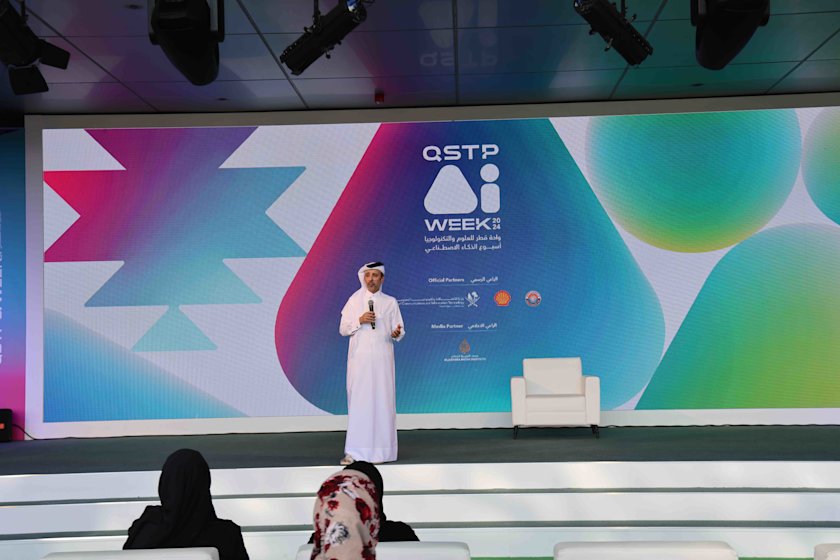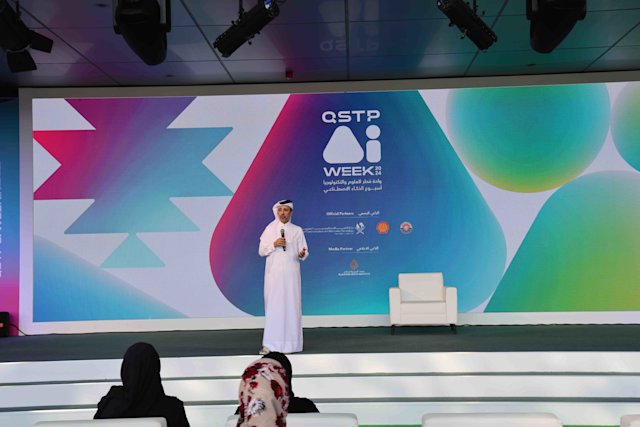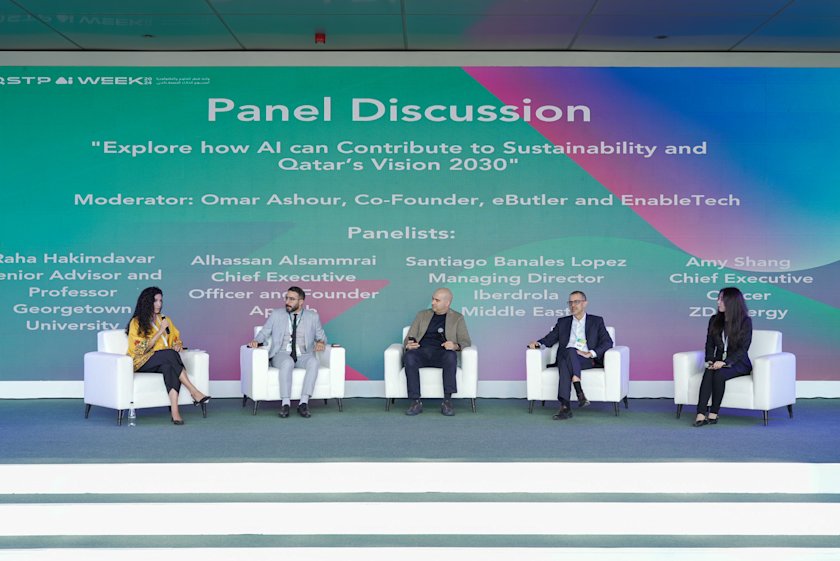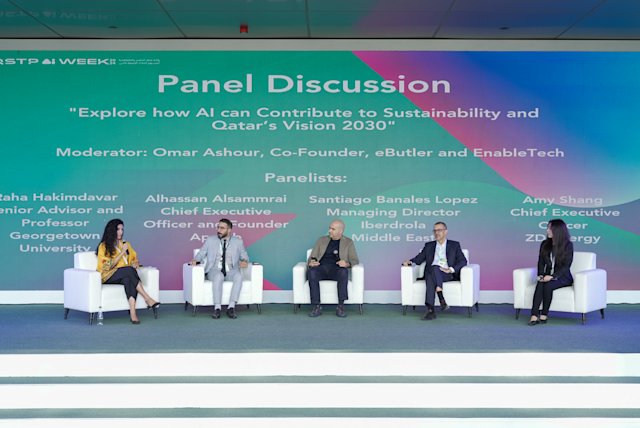Innovation and Integration
Our world is experiencing rapid technological advancement, particularly with the widespread adoption of AI in many aspects of daily life. To remain competitive, we must embrace AI to enhance productivity and optimize various elements of our lives.
Qatar Foundation’s (QF) strategic focus on AI is partly aimed at creating homegrown and culturally relevant tools that cater to the needs of a diverse population of users and innovators. Our unique position in education, technological incubation, and the private sector supports an effective research-to-startup pipeline, paving the way for new technological products and opportunities for commercialization and development influence. QF’s ecosystem fosters innovation and entrepreneurship, enhancing the AI-driven value chain in education, healthcare, smart cities, analytics, and decision-making.
QF’s strategic priority of AI focuses on discovery, innovation, and practice across many key sectors, including education, health, and culture. Its higher education landscape continues to offer cutting-edge degrees in information systems and computer science at Carnegie Mellon University in Qatar (CMU-Q) and Hamad Bin Khalifa University (HBKU).
QF’s ecosystem enables innovation and entrepreneurship to thrive, resulting in successful patents and startups that apply AI and computational models, such as HBKU startup AiScia, which integrates AI, advanced computations, and global expertise to accelerate sustainable material discovery for industries, researchers, scientists, and engineers.
Our world is experiencing rapid technological advancement, particularly with the widespread adoption of AI in many aspects of daily life. To remain competitive, we must embrace AI to enhance productivity and optimize various elements of our lives.
Qatar Foundation’s (QF) strategic focus on AI is partly aimed at creating homegrown and culturally relevant tools that cater to the needs of a diverse population of users and innovators. Our unique position in education, technological incubation, and the private sector supports an effective research-to-startup pipeline, paving the way for new technological products and opportunities for commercialization and development influence. QF’s ecosystem fosters innovation and entrepreneurship, enhancing the AI-driven value chain in education, healthcare, smart cities, analytics, and decision-making.
QF’s strategic priority of AI focuses on discovery, innovation, and practice across many key sectors, including education, health, and culture. Its higher education landscape continues to offer cutting-edge degrees in information systems and computer science at Carnegie Mellon University in Qatar (CMU-Q) and Hamad Bin Khalifa University (HBKU).
QF’s ecosystem enables innovation and entrepreneurship to thrive, resulting in successful patents and startups that apply AI and computational models, such as HBKU startup AiScia, which integrates AI, advanced computations, and global expertise to accelerate sustainable material discovery for industries, researchers, scientists, and engineers.
| AI Research | 2024 |
|---|---|
| Publications | 300+ |
| Granted patents | 5 |
 +
+
AI for Learning
QF is working to unpack how AI is used in K-12 classrooms by both teachers and students. As part of its role in education leadership, QF is investigating the use of AI in the classrooms so that future leaders are prepared to utilize AI technology effectively.
A new strategic flagship initiative launched by Northwestern University in Qatar, the Artificial Intelligence Initiative (AI2), focuses on meeting the global challenges of AI and contributing to research and teaching. AI2 positions NU-Q as a central player in shaping the understanding and application of AI in global higher education and the media and creative industries worldwide.
AI2 is also built around a joint curriculum in Media and AI, designed by Northwestern Qatar and CMU-Q. The Media and AI curriculum offers students the opportunity to earn a Minor in this field. Its goal is to prepare students to navigate the rapidly changing intersection of AI and media, focusing on both the applications of AI in media and the ethical considerations that arise from these developments.
Meanwhile, exploring the role of AI in the future path for higher education and skills development is the purpose of a new international research consortium led by WISE. Together with the Institute of International Education, WISE and seven universities have embarked on a 12-month series of studies across diverse geographical contexts. The aim is to provide new insights into integrating AI into educational curricula and practice, exploring its role in closing the skills gap, and preparing students for an AI-driven world of work.
QF is working to unpack how AI is used in K-12 classrooms by both teachers and students. As part of its role in education leadership, QF is investigating the use of AI in the classrooms so that future leaders are prepared to utilize AI technology effectively.
A new strategic flagship initiative launched by Northwestern University in Qatar, the Artificial Intelligence Initiative (AI2), focuses on meeting the global challenges of AI and contributing to research and teaching. AI2 positions NU-Q as a central player in shaping the understanding and application of AI in global higher education and the media and creative industries worldwide.
AI2 is also built around a joint curriculum in Media and AI, designed by Northwestern Qatar and CMU-Q. The Media and AI curriculum offers students the opportunity to earn a Minor in this field. Its goal is to prepare students to navigate the rapidly changing intersection of AI and media, focusing on both the applications of AI in media and the ethical considerations that arise from these developments.
Meanwhile, exploring the role of AI in the future path for higher education and skills development is the purpose of a new international research consortium led by WISE. Together with the Institute of International Education, WISE and seven universities have embarked on a 12-month series of studies across diverse geographical contexts. The aim is to provide new insights into integrating AI into educational curricula and practice, exploring its role in closing the skills gap, and preparing students for an AI-driven world of work.
QF graduates of information and computer science programs – 2023/24 Academic Year
| Carnegie Mellon University in Qatar | Bachelor of Science in Computational Biology | 100+ |
|---|---|---|
| Bachelor of Science in Computer Science | ||
| Bachelor of Science in Information Systems | ||
| Hamad Bin Khalifa University | Bachelor of Science in Computer Engineering | |
| Master of Data Analytics in Health Management | ||
| Master of Information Systems in Health Management | ||
| Master of Science in Cyber Security | ||
| Master of Science in Data Science and Engineering | ||
| PhD in Computer Science and Engineering |
 +
+
Supporting a Healthier World
QF’s research institutes are utilizing AI to integrate essential data and explore developing algorithms and analyses that can advance healthcare in the country, including prevention, diagnosis, and treatment.
HBKU experts are working to create digital tools to meet the needs of children with autism spectrum disorder and similar learning disabilities. Since 2021, they have been working on the first Arabic digital phenotyping for social communication behaviors as a diagnostic tool for autism, using machine learning and AI, in collaboration with US-based Argus Cognitive. HBKU is also progressing with key healthcare research projects using machine learning and AI techniques in diabetes, neurological disorders, and breast cancer.
Meanwhile, Weill Cornell Medicine-Qatar (WCM-Q) has adopted a comprehensive AI strategy that builds on institutional capabilities and know-how to improve healthcare diagnosis and treatment in Qatar. Under the auspices of its Precision Health Innovation and Education Centre, WCM-Q is applying AI to improve healthcare nationally in collaboration with all national biomedical stakeholders, including QF and Hamad Medical Corporation. These include using AI for imaging and faster diagnosis, improved patient care, and deep molecular phenotyping using multiomics integration toward better personalized medicine treatments, as well as monitoring and improving individual wellness.
A report on the ethics of AI in healthcare – ‘AI and Healthcare Ethics: Islamic Perspectives on Medical Accountability’ - was carried out by HBKU and the World Innovation Summit for Heath (WISH) and published at the WISH 2024 summit. It explores some of the more common adoptions of technology in healthcare and the associated ethical challenges, focusing on the Islamic perspective; and provides recommendations to address ethical deliberations on the patient-physician relationship in the age of AI-enabled healthcare.
QF’s research institutes are utilizing AI to integrate essential data and explore developing algorithms and analyses that can advance healthcare in the country, including prevention, diagnosis, and treatment.
HBKU experts are working to create digital tools to meet the needs of children with autism spectrum disorder and similar learning disabilities. Since 2021, they have been working on the first Arabic digital phenotyping for social communication behaviors as a diagnostic tool for autism, using machine learning and AI, in collaboration with US-based Argus Cognitive. HBKU is also progressing with key healthcare research projects using machine learning and AI techniques in diabetes, neurological disorders, and breast cancer.
Meanwhile, Weill Cornell Medicine-Qatar (WCM-Q) has adopted a comprehensive AI strategy that builds on institutional capabilities and know-how to improve healthcare diagnosis and treatment in Qatar. Under the auspices of its Precision Health Innovation and Education Centre, WCM-Q is applying AI to improve healthcare nationally in collaboration with all national biomedical stakeholders, including QF and Hamad Medical Corporation. These include using AI for imaging and faster diagnosis, improved patient care, and deep molecular phenotyping using multiomics integration toward better personalized medicine treatments, as well as monitoring and improving individual wellness.
A report on the ethics of AI in healthcare – ‘AI and Healthcare Ethics: Islamic Perspectives on Medical Accountability’ - was carried out by HBKU and the World Innovation Summit for Heath (WISH) and published at the WISH 2024 summit. It explores some of the more common adoptions of technology in healthcare and the associated ethical challenges, focusing on the Islamic perspective; and provides recommendations to address ethical deliberations on the patient-physician relationship in the age of AI-enabled healthcare.


The Cultural Aspect
Using machine learning and other AI tools, QF aims to address regional and global gaps in the availability of Arabic language tools and content on the internet, which disproportionately caters to English-speaking users. This reflects QF's commitment to promoting the growth and usage of Arabic and increasing cultural relevance, with a focus on education, AI, and youth development.
The Fanar project, which results from a strategic cooperation between the Ministry of Communications and Information Technology and HBKU, emerged in 2024 as a significant game-changer for the Arabic language, culture, and AI. One of the most essential and contemporary AI models in the Arabic language, Fanar relies on a considerable dataset containing more than 400 billion words of high-quality Arabic text, using this to produce high-quality texts that enhance the representation of the Arabic language in the field of artificial intelligence globally. Fanar’s platform can help government entities develop tailored solutions for public services, communication and build applications for different sectors.
Using machine learning and other AI tools, QF aims to address regional and global gaps in the availability of Arabic language tools and content on the internet, which disproportionately caters to English-speaking users. This reflects QF's commitment to promoting the growth and usage of Arabic and increasing cultural relevance, with a focus on education, AI, and youth development.
The Fanar project, which results from a strategic cooperation between the Ministry of Communications and Information Technology and HBKU, emerged in 2024 as a significant game-changer for the Arabic language, culture, and AI. One of the most essential and contemporary AI models in the Arabic language, Fanar relies on a considerable dataset containing more than 400 billion words of high-quality Arabic text, using this to produce high-quality texts that enhance the representation of the Arabic language in the field of artificial intelligence globally. Fanar’s platform can help government entities develop tailored solutions for public services, communication and build applications for different sectors.
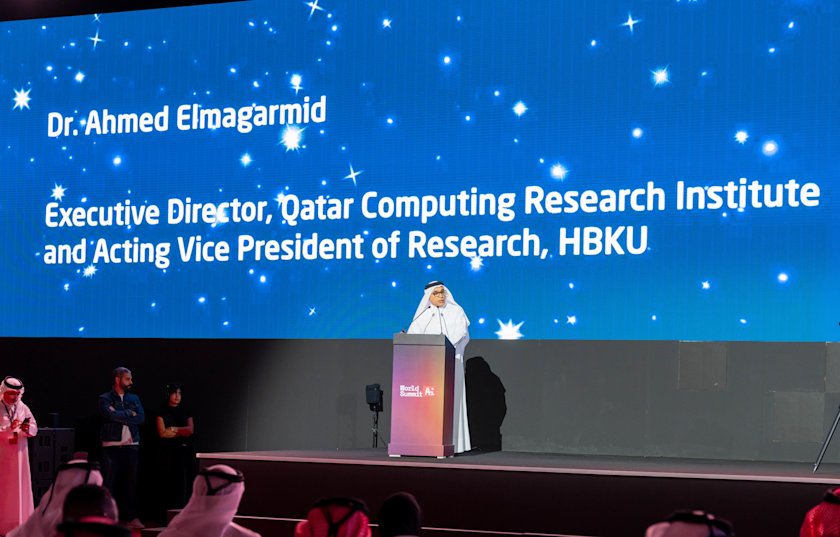
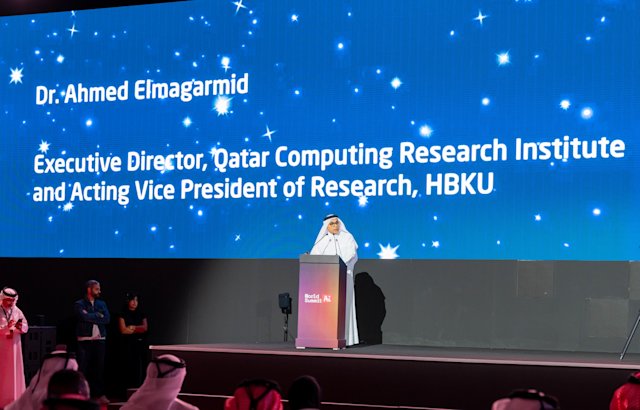


Building AI Connections
In 2024, QF enhanced its network of researchers working in the AI domain to create additional collaborative research platforms and build channels for commercialization. Qatar Science & Technology Park welcomed around 3,000 attendees for its AI Week 2024.
Expanding cross-sector collaborations to build AI capacity, HBKU also formed a new partnership with Q-CTRL, a global leader in quantum technologies, to build the next generation of quantum professionals in Qatar through world-class education and software.
The Huawei HBKU AI Information and Communications Technology (ICT) Academy Lab, inaugurated in January 2024, is a hub for innovation and hands-on learning experiences at the cutting edge of technology. The lab is equipped with cutting-edge infrastructure and resources and shows collaboration and investment by prominent tech companies. It will offer specialized training programs, workshops, and certification courses designed to empower students and industry professionals in the rapidly evolving fields of AI and ICT.
In 2024, QF enhanced its network of researchers working in the AI domain to create additional collaborative research platforms and build channels for commercialization. Qatar Science & Technology Park welcomed around 3,000 attendees for its AI Week 2024.
Expanding cross-sector collaborations to build AI capacity, HBKU also formed a new partnership with Q-CTRL, a global leader in quantum technologies, to build the next generation of quantum professionals in Qatar through world-class education and software.
The Huawei HBKU AI Information and Communications Technology (ICT) Academy Lab, inaugurated in January 2024, is a hub for innovation and hands-on learning experiences at the cutting edge of technology. The lab is equipped with cutting-edge infrastructure and resources and shows collaboration and investment by prominent tech companies. It will offer specialized training programs, workshops, and certification courses designed to empower students and industry professionals in the rapidly evolving fields of AI and ICT.
